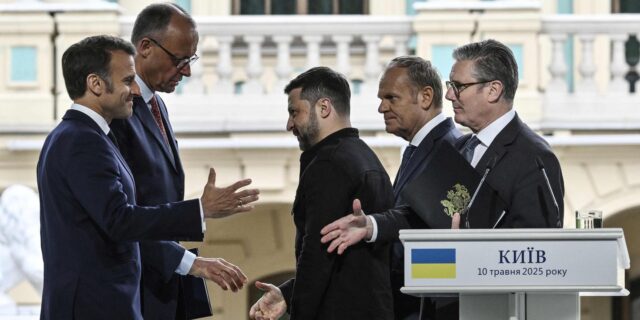Shifting Tides: Trump’s Ceasefire Call Draws Criticism from Kyiv and Europe
In a significant shift in foreign policy, President Donald Trump has called for a ceasefire prior to his upcoming meeting with Russian President Vladimir Putin. This unexpected pivot has raised alarm among officials in Kyiv and various European leaders, who view Trump’s stance as detrimental to their strategic goals concerning the ongoing conflict in Ukraine.
Disappointment in Europe and Ukraine
Trump’s sudden demand for a ceasefire comes as a surprise, particularly for Ukraine, which is embroiled in an ongoing battle with Russian-backed separatists. The request contradicts the longstanding positions of both European nations and Ukrainian officials, who have highlighted the necessity of continued pressure on Russia to withdraw its forces from Ukrainian territory. Many see this move as offering Russia an undeserved advantage rather than promoting peace and stability in the region.
As the ceasefire request is made public, there is a palpable sense of dismay among European leaders. For them, the diplomatic and military responses to Russia’s aggression in Ukraine have been crucial elements of their foreign policy. President Trump’s actions may indicate a willingness to entertain a more conciliatory approach towards Russia that diverges sharply from NATO’s collective stance.
The Broader Context: U.S.-Russia Relations
The announcement comes in the wake of Trump’s summit with President Putin in Alaska, where discussions about multiple global issues, including Ukraine, were on the agenda. Trump’s recent overtures are not the first of their kind; ongoing speculation suggests that he may be seeking a more amicable relationship with the Kremlin, potentially at the expense of Ukraine and its allies.
In Kyiv, Ukrainian President Volodymyr Zelensky expressed his concerns, stating, “A ceasefire without conditions is a dangerous prospect that only legitimizes Russia’s actions.” Zelensky’s words encapsulate the fear that a rushed peace initiative could lead to further destabilization in the region.
Humanitarian Concerns Amid Rising Tensions
Meanwhile, the humanitarian situation continues to deteriorate. Reports have emerged indicating that aid shipments have inadvertently been dropped into designated areas of conflict, risking the lives of both the aid workers and the recipients. This unsettling development further complicates an already precarious situation on the ground, highlighting the urgent need for stable communication and clear assistance protocols.
The following table summarizes key concerns surrounding the ceasefire call and its potential ramifications:
| Aspect | Details |
|---|---|
| Ceasefire Demand | Unconditional call from Trump before meeting Putin |
| Reaction from Kyiv | Concerns over legitimizing Russian aggression |
| European Response | Dismay and anxiety regarding shifting U.S. policy |
| Humanitarian Impact | Aid dropped in dangerous areas raises risks |
Looking Ahead
The international community’s response will be closely monitored as Trump prepares for his meeting with Putin. The balance of power in Eastern Europe hangs in the balance, and the outcome of this meeting could significantly influence the future trajectory of U.S.-Russia relations and the ongoing conflict in Ukraine. Both Trump and European nations will need to navigate these turbulent waters with caution to avoid further escalation of tensions.














